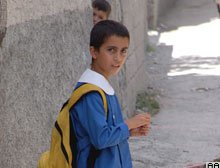“I find it difficult to understand topics that were studied earlier. I have to work harder than anyone else. I ask my friends for their note books in order to study the earlier topics, but it is difficult. When I first came, they said: ‘You have failed the class; you have been absent for two months, the teacher is going to fail you.’ I cried a lot because of that.”
This is what nine-year old Ayse told researchers of the educational trade union Egitim-Sen who have studied the thousands of children who work as seasonal labourers. They experience these difficulties every autumn when school restarts.
Repeated a year three times
13-year old Ismail says:
“When I stay away for four months, I cannot keep up with my friends; they do not want to play with me. That’s why I don’t want to go to school. Working affects my studies badly. I spend at least four months away. I am unsuccessful in some classes, and I have had to repeat a year three times. If my father had work, I would not have to go and I would not fail.”
Children worrying over debts
11-year old Halime is worried because the money she and her family earn only pays the debts:
“We went to [pick the] cotton because we had a lot of debts. Then we paid them. We could not buy clothes. When people brought us clothes, we had no choice but to wear thme. My friends asked me, ‘Why are you wearing our clothes?’”
9 percent cannot attend regularly
The study was carried out in the provinces of Sanliurfa, Adiyaman, Adan, Batman, Diyarbakir and Gaziantep, all areas were seasonal agricultural labour is common. The trade union looked at 115 primary schools in different districts.
The total number of pupils in these schools is 243,339. Of these, 23,683 pupils leave early and come back late because of seasonal work. This amounts to 9,82 percent of all students.
In Sanliurfa, the problem is the most pressing. In some neighbourhoods, one in five pupils has to leave school. With absences of over forty days being the average, some pupils are well above that and lose all chances of an education.
The time for seasonal work starts before the end of March and can last up to November.
Common problems
Some of the problems these pupils have were summarised by the study:
- Not wanting to spend the little money they earned in the months they worked, families rent minibuses or buses and fill them with far too many passengers. (This summer, there were several accidents involving such vehicles, and predominantly young people died.)
- After experiencing negative living and working conditions, the pupils who come to school are not only psychologically distant, but also physically exhausted.
- Pupils are depressed by the fact that they are not able to afford necessities like shoes, pens and notebooks.
- Because the children’s education does not earn the family any money, families interrupt their children’s education. Even keen pupils may be forced to leave school. (GG/TK/AG)







